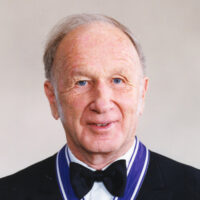
1991 Kyoto Prize Laureates
Earth and Planetary Sciences, Astronomy and Astrophysics
/ Meteorologist
1917 - 2008
Professor Emeritus, Massachusetts Institute of Technology
1991
11 /11 Mon
Place:Kyoto International Conference Center
From Weather Forecasting to Chaos
1991
11 /12 Tue
13:00 - 17:25
Place:Kyoto International Conference Center
A meteorologist who established the theoretical basis of weather and climate predictability, as well as the basis for computer-aided atmospheric physics and meteorology. He made his boldest scientific achievement in discovering “deterministic chaos,” a principle which has profoundly influenced a wide range of basic sciences and brought about one of the most dramatic changes in mankind’s view of nature since Sir Isaac Newton.
Dr. Edward Norton Lorenz is recognized world-wide not only as one of the outstanding theoretical meteorologists of our day, but also as a pioneer in the new major area of scientific study known as “deterministic chaos,” which has applications in many fields ranging from pure mathematics to physics, engineering, chemistry, biology, economics and geology as well as his own field of atmospheric science.
As a theoretical meteorologist, he refined the concept of available potential energy and formulated the equations governing the energetics of the atmospheric general circulation. He then simplified these equations to form a basis for numerical prediction of weather and climate by computer models. His mathematical methodology has been widely used in making numerical simulations of the atmospheric circulation in connection with global ecological problems.
In the study of thermal convection in the gravitational field, he introduced the use of low-order truncated representations of atmospheric dynamics to elucidate the fundamental physics of atmospheric flow phenomena with minimal sets of nonlinear ordinary differential equations. This approach led to his discovery of the first system of differential equations, a dissipative system with a degree of freedom of only three, whose solution constitutes the prototypical example of deterministic chaos. He discovered that deterministic nonlinear dynamics can produce what he called “the butterfly effect,” in which a minute change in an initial state may well result in a huge difference in a future state. Furthermore, by introducing the notions of transitivity and intransitivity, he clarified the complexity of the climatic system and gave a theoretical basis for abrupt climatic changes.
Dr. Lorenz’s discovery of deterministic chaos gave a clear mathematical explanation for the ubiquitous lack of predictability and thus revolutionalized our understanding of nature in all of the sciences and beyond. It is for these reasons that Dr. Lorenz is most deserving of the 1991 Kyoto Prize for Basic Sciences.
Profile is at the time of the award.